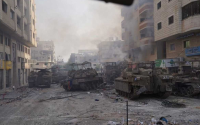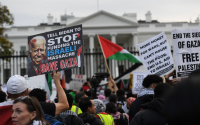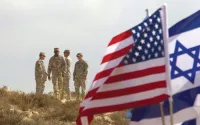Thursday April 18, 2002The GuardianGeneral Van Baal was the Dutch army's chief of staff - until yesterday afternoon. Then he followed the example of the entire Dutch government and resigned. Opinion is sharply divided as to whether the Dutch establishment is demonstrating an exceptional collective responsibility or engaging in a bizarrely quixotic piece of political theatre. The Netherlands Institute for War Documentation report into the Dutch peacekeepers' role in the Srebrenica massacre of 1995 was commissioned by the Dutch government in 1996 and published last week. The report doesn't even mention General Van Baal, let alone most of the cabinet of Wim Kok, the outgoing prime minister, yet these senior members of the Dutch state are doing the honourable thing and falling on their swords. The report, which has triggered Holland's biggest political crisis in recent years, doesn't call for anyone's resignation; it doesn't even attribute the burden of guilt to Holland. It apportions measures of blame to the international community and the UN authorities inside and outside the former Yugoslavia. If you are looking to understand what lies behind this flurry of resignations, the report isn't going to help much. What it does clarify is the desperate plight of Dutchbat - the beleaguered, demoralised Dutch soldiers who had the responsibility in July 1995 for implementing the safe havens policy. It describes a crazily conceived international figleaf (liberal interventionism on the cheap) with ludicrous terms of engagement, which amounted to the misplaced belief that the mere presence of a UN force was a sufficient deterrent to the Bosnian Serbs. The air support that might have protected the 8,000 massacred in Srebrenica - which Dutchbat called for - never materialised courtesy of a jittery UN. It was an impossible mission, all now agree; many fond illusions in the international community about a new era of peacekeeping died along with the Bosnian Muslims, and it was largely a matter of chance that it happened on the Dutch watch. The only possible crime that the Dutch government could be accused of was naivety. They didn't take up the CIA's offer of agents to intercept Bosnian Serb communications and they didn't debrief their Canadian predecessors in Srebrenica, who withdrew, arguing that the policy was unsustainable. But the naivety was evident across the entire Dutch political culture: parliament, the media and the country was swept along by a morally outraged public opinion that Something Must Be Done that allowed no room for a critical examination of what that Something was. The Dutch were one of the few nations to offer soldiers for the 32,000-strong force first envisaged under the Owen-Vance peace plan; in the end the number barely scraped 6,000. They found themselves propping up a bankrupt international policy not of their devising: the fate, you could argue, as did one contributor to a website debate yesterday, of a "small country with a big heart". Ironically, the moral outrage that landed Dutchbat in Srebrenica shares roots with the outrage that is now reaping such a rich harvest of establishment scalps. Srebrenica has haunted Dutch politics as the media has rootled out embarrassing detail, accusing the Dutch army of attempting to cover up the scandal in a bid to protect its prestige. The witchhunt has become a way to expiate the national guilt. What was shattered in Srebrenica was the Netherlands' proud belief in their virtually unparalleled virtuous internationalism - one of the biggest aid budgets (as a percentage of GDP) in the world and a long record of peacekeeping. The resignations became a means to reclaim that moral superiority by taking on the guilt of the international community. None of this would make much sense in any other political culture. Is this the legacy of a Dutch Calvinist emphasis on moral purity? Or even more plausibly, are there shadows of the second world war here? Anne Frank, the young girl who has become iconic for successive generations in their attempt to understand the Holocaust, was betrayed. As were many others in Amsterdam, one of the biggest and most vibrant Jewish communities in Europe before the war. Holland was not alone in seeing the Bosnian conflict through the prism of unresolved second world war guilt. Bosnian ethnic cleansing was the worst European atrocity since 1945 and it destroyed a postwar dream that Europe would never witness such violence again. Two sets of images have left an indelible image on the Netherlands. The first was footage of Dutchbat assisting Bosnian Muslims who had taken refuge in their compound on to the buses that would take them to their deaths. The second was footage of Dutchbat soldiers on a drunken evening in Zagreb shortly afterwards, seemingly indifferent to the consequences of their actions. These images told only a small part of the complex story, but they provided the Dutch public with a chilling narrative of collaboration and hard-hearted indifference. Something Had To Be Done for national absolution - as Wim Kok realised in a gesture rich in symbolism but with little political significance; the government continues in a caretaker role until elections next month. The Netherlands was not the first country to be left to carry the can for a decade of internationalism on the cheap. With eager eyes on reaping the peace dividend, greedy trimming of aid budgets and the end of the cold war, key western powers in the 1990s thought international order was just a matter of a few UN peacekeepers. Both Canada and Belgium, like the Netherlands, have been racked with the guilt of a failure that owed more to Washington than it did to Ottawa or Brussels. In Canada, two senior army figures resigned following the court martials of six soldiers involved in the torture and murder of a Somali boy in 1993; the country struggled to reconcile the incident with its history of enlightened internationalism. Rwanda was even worse; a Canadian general broke down and wept in a war crimes trial, still traumatised by his failure to prevent genocide, while in 2000, the Belgian prime minister gave a formal apology for the withdrawal of Belgian troops ahead of the massacre. Such national traumas have dampened the always fragile enthusiasm for international peacekeeping; painful reminders that such exercises are as likely to bring humiliation as prestige. Watch Turkey's wariness of being drawn into Afghanistan. Indeed, Dutchbat's experience makes painful reading alongside the arrival of more British soldiers in Afghanistan. The latter may be better trained and equipped, but there are disturbing parallels, such as having an ill-defined purpose and no exit strategy. [email protected] Guardian Unlimited © Guardian Newspapers Limited 2002
Something had to be done. But no one knew what it
Türkiye ve dünyadan barış ve adaletin seslerine yeniden...
Ekolojiden siyasete, edebiyattan müziğe Açık Radyo'da haftanın öne çıkan gündemleri mail kutunuzda!
İletişim
Anafor Radyo Yayıncılık A.Ş.
Hacımimi Mahallesi, Lüleci Hendek Caddesi
Koltukçular Çıkmazı No 7 Kat 1-2
Tophane, 34425, Beyoğlu, İstanbul, TR
Telefon: +90 212 343 4040
Faks: +90 212 232 3219
E-posta: [email protected]






